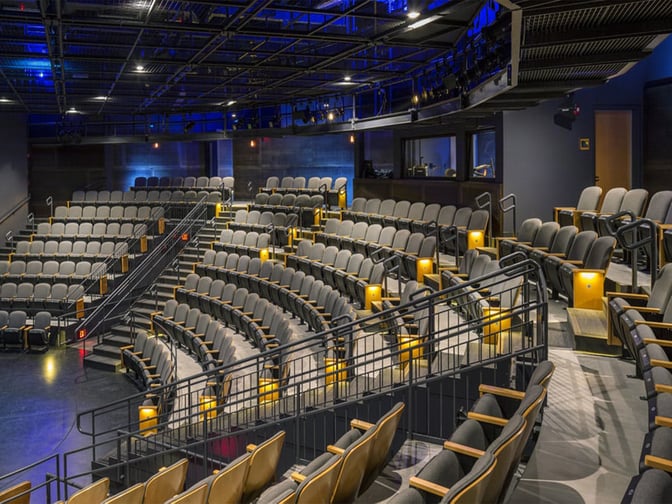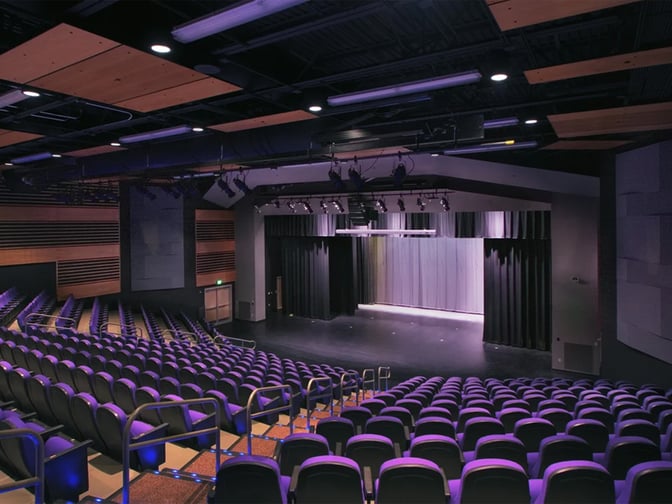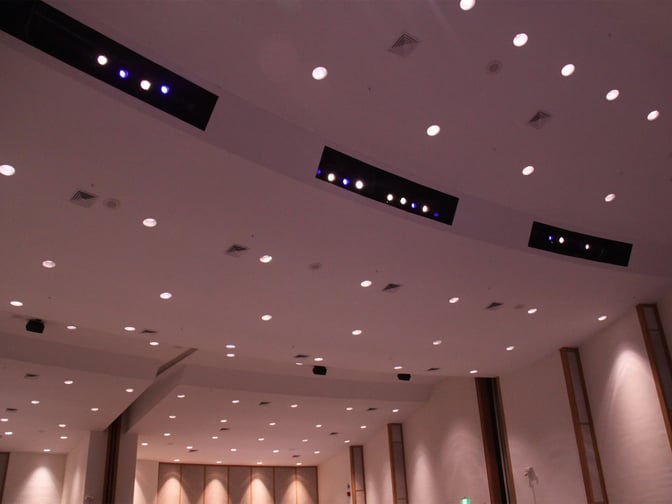Share this
PORT: A Guide to Theatrical Lighting Design & Specification
by PORT on Jan 9, 2024 2:25:23 PM
.webp?width=2500&height=1667&name=Port%2BLighting%2BSystems%2BTheater%2BLighting%2BAuditorium-1%20(1).webp)
Delve into the art and precision of theatrical lighting design and specification, where strategic planning meets creative ingenuity to illuminate stages and elevate storytelling through carefully crafted visual atmospheres.
January 2024 -
What Is Theatrical Lighting Design and Specification?
Theatrical lighting design is the art and science of creating and controlling lighting in a theatrical production or performance to enhance the visual and emotional aspects of a production.
A company creating a theatrical lighting design and specification will collaborate closely with the technical and creative teams of a venue to understand and devise a lighting plan/design specification that empowers the space to achieve its intended function.
Elements included in the design process are:
- Selection/placement of lighting fixtures
- Selection of control
- Lighting Plot
- Design specification to include a rigging system
A design company must know all elements and account for all of them throughout the design and specification process.
The Process of Theatrical Lighting Design and Specification
The process of theatrical lighting design commences with a requirement for collaboration between the design company and the client. In this collaborative phase, it is crucial to gain insights into the venue’s needs and the kinds of productions that take place within the space.

For existing venues, a site visit is typically conducted to assess potential locations for lighting fixtures, understand the venue’s unique features, obtain measurements, and identify any obstacles that might pose challenges.
In the case of new construction, an initial step involves reviewing building specifications to initiate the design and specification process. After establishing a thorough understanding of the venue, the next step is to craft a lighting plot. The lighting plot outlines the fixture types, their placements, and how they will be wired.
During the development of this lighting plot, careful consideration is given to the fixture selection to ensure that the appropriate fixtures are placed in the correct positions, aligning with the design objectives.
Following the creation of the lighting plot, the design process advances to the generation of a design specification. This specification includes approved equipment, encompassing lighting fixtures, and rigging apparatus. It is a detailed document featuring precise placement of lighting, rigging, control equipment, a control channel diagram, and an electrical diagram.
Following the delivery of a design specification and lighting plot to the client, the design company takes on the responsibility of overseeing the installation’s quality throughout the entire project. Upon project completion, they assess whether the installation meets the specified standards. If they find it to comply, they will provide their approval.
Why PORT?
When using PORT for your theatrical lighting design and specification needs, you can expect support and expertise through every step of the process. Our team has the unique capabilities to design and build your lighting installation from the ground up using our extensive knowledge of theatrical lighting installation and design.
What To Expect When Using PORT For Your Theatrical Lighting Design
Step 1: Establishing Your Needs
The process begins with an initial call in which we will explore your installation requirements. Within this conversation, we will inquire whether you already have a design specification or lighting plot.
If you don’t have one prepared, our design team will gladly assist in its creation. Having a lighting plot or design specification is of paramount importance for theatrical lighting installations.
Step 2: Site Visit From PORT
After an initial conversation to establish your needs, our team will schedule an on-site visit to your facility. During this site visit, we will conduct a comprehensive assessment, which includes but is not limited to:
- Understanding the unique features of the space
- Taking critical measurements
- Evaluating the existing elements within the space
- Confirming the location of power sources
- Inspecting any pre-existing rigging
- Providing recommendations as needed
Following the site visit, our team will move forward to craft a proposal that is tailored to meet the requirements for designing and specifying your project.
The proposal encompasses the following services:
- Selection of approved equipment
- Comprehensive drawings displaying installation details and
all necessary information - Equipment specifications
- The number of necessary meetings
- The included number of site visits
- The hours required

Step 3: Creating and Insuring Your Design
Upon approval of the proposal, our team will initiate the process of creating your lighting plot and design specification. Throughout the development of your plot and specification, our team will work to ensure that your specification aligns with your space design requirements.
During the installation process, our team will make periodic visits to the site to ensure precise adherence to the design specifications. Following the installation completion, we will perform an inspection to verify that everything installed conforms to the specifications. Once approved, the project will be complete.
At PORT we are not only designers but also an installation company, which gives us a deep understanding of the installation and design process. Our team stays well-informed on the latest equipment through strong partnerships with our manufacturers, ensuring our knowledge is current and up-to-date.
- Lighting Production Services
- Technical Production Management
- Production Design
- Corporate Production Management
- Theatrical Lighting Design/Specification
- Theatrical Lighting Installation
- Stage Curtain & Rigging Installation
- Rigging Inspections

Want to take this article with you?
Share this
- Event Production (25)
- Event Lighting (20)
- Event Planning (19)
- Lighting Control Systems (15)
- Theatrical Lighting (15)
- event lighting services (15)
- Architectural Lighting (13)
- Lighting Effects (11)
- Architectural Lighting Design (10)
- Theatrical rigging (10)
- Architectural Lighting Installation (7)
- LED Light (7)
- Wedding Lighting (7)
- Theatrical Installations (6)
- Theatrical Lighting Installation (6)
- Installation (5)
- Rigging (5)
- Stage Lighting (5)
- Event Drape (4)
- Lighting Integration Services (4)
- Rigging Inspection (4)
- Design (3)
- Production Design (3)
- Technical Production Management (3)
- Theatrical Lighting Design (3)
- Virtual Content (3)
- Audio-Visual (2)
- Concert Lighting (2)
- Corporate Production Services (2)
- Lighting History (2)
- Sports Lighting (2)
- 3D Rendering (1)
- Bridge Lighting (1)
- Commercial Lighting (1)
- Logistics (1)
- Operations (1)
- Pre-Visualization (1)
- Virtual Event (1)
- April 2025 (1)
- March 2025 (2)
- January 2025 (1)
- December 2024 (1)
- November 2024 (1)
- October 2024 (1)
- September 2024 (1)
- August 2024 (1)
- May 2024 (1)
- April 2024 (1)
- March 2024 (2)
- February 2024 (2)
- January 2024 (3)
- December 2023 (3)
- November 2023 (6)
- October 2023 (1)
- September 2023 (1)
- July 2023 (1)
- March 2023 (1)
- January 2023 (4)
- December 2022 (3)
- November 2022 (4)
- October 2022 (4)
- September 2022 (4)
- August 2022 (2)
- July 2022 (3)
- June 2022 (13)


No Comments Yet
Let us know what you think